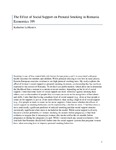The Effect of Social Support on Prenatal Smoking in Romania (thesis)

View/
Author
LeMasters, Katherine H. (Kate)
Subject
Washington and Lee University -- Honors in Economics
Smoking -- Health aspects
Pregnant women -- Tobacco use
Social networks
Romania
Metadata
Show full item recordDescription
Thesis; [FULL-TEXT FREELY AVAILABLE ONLINE] Katherine H. (Kate) LeMasters is a member of the Class of 2015 of Washington and Lee University. Smoking is one of few controllable risk factors for pregnancy and it is associated with poor health outcomes for mothers and children. While prenatal smoking is now low in many places, Eastern European countries continue to see high prenatal smoking rates. My study explores the effect of women's social support on prenatal smoking decisions, a relationship that has not been explored in the context of Romania. To do this I use probit models, which allow me to determine the likelihood that a woman is a current or recent smoker, depending on her level of social support. I find that some facets of social support are more protective against smoking than others, such as the number of people that a woman can count on for recognition of her talents and skills. I also find that having a medium level of social support (e.g., three or four people to count on for support) is just as, if not more effective, than having a high level of social support (e.g., five people or more to count on for social support). I then assess whether the effects of social support on smoking behaviors can be explained by a decline in stress. I find that stress is not a statistically significant predictor of reduced smoking and that social support remains statistically significant when stress is included in the model. While social support is directly linked to a lower probability of women smoking six months before pregnancy, I find little evidence to suggest that it encourages women who smoke within the six months before pregnancy or during her pregnancy to quit. While I cannot reach any causal conclusions, I do conclude that Romania should look further into the social support systems that pregnant women have when assessing how to improve prenatal smoking behaviors. Katherine LeMasters